|
I was notified of an old comment I made on Disqus, and I thought that maybe, just maybe, it would be cool to preserve it. I always knew sour dough and rabies together were trouble, but I have another quibble with that factor. It's called mass-produced multi-groan conundrum. Don't try to look it up. It's all in my head. When you suffer from this, everything looks like it's made of lemons to you. When life gives you lemons you make lemonade, huh? Well, I CAN'T DO THAT! I can't do that because it's ALL lemons to me! How you do expect me to make lemons out of every gosh-darn hash-brown-tagged scot-free pilgrimage to the Canadian border when the fuzzy stuff is nonsense to fear's diatribe?! I don't want to drink the lemon cat, oh Lordy noooooOOOOOOO!!!! Life, give me lemons no more! The curtains are peeling, their rinds...wait...RINDS (?!) are blasphemous and counterproductive if there is smoke but no cigar. They're coming, they're coming they're coming they're coming to TAKE AWAY THE JARGON'S FREEDOM! Liberty! Liberty! Give me liberty from life's lemons or give ME dEaTh! no...no...I knew it...I KNEW IT...........The lemon WAS a CAT!!! Tissues...tissues if you have them...oh gosh...SQUEAAAAAAAAAAAAKY! Nothing...NOTHING is as bad as...gollup. ...Now if you'll excuse me, I'm going to go wash my mouth out with some soap. ...Defibrillators don't need to come out no more. Here is a sample scene from the book I have been working on (the title of this post being an acronym for the title of the book, which I am not disclosing yet). Be aware that even though there is harsh content, it is even harsher on me; it hurts me to enter this world I have created, because the material weighs on me and everything is significant. You may have several concerns about what is happening in this passage, and believe me when I say I am fully aware of them. By Isaac Summers Just as suddenly as she had begun to speak, young little Mrs. Avangine was back on the cotton seat in the corner of a couch. The smell of cooking meat wafted to her sensitive nose, and it was not a pleasure. It gave her migraines, and the fan up above circling only made the cacophony of it all even worse. She could hear the voices elsewhere in the place over the mighty din from the small television on the dilapidated table. The notes were all devils to her personal stability. The accents placed on the syllables told her that this time things were worse than normal. Papa waddled in, his face lowered, trying to hold back something that could make him capsize. The screen door closed behind him as he left. The chilly wind had swept in as a figure who was comfortable with its surroundings. It padded its way to her and nuzzled her leg with its head. This used to help her, for she knew there was something there to comfort and to bond with. Now the touch's cold was felt more than it had before. It felt distant and unfeeling. The empty cushions did not disguise any absences. They were vacant, and nobody was really there. The wind was an echo of something that could never be attained. She was limited to her own little section of the world, where none would come over and sit down beside. The cushions gathered dust, and the fan only moved them, making room for someone never to come to sit, gradually letting all the little particles settle without finding any warm contact. The fan allotted those that already had trouble staying warm more opportunity to remain stagnant. The wind was not there. She looked down at its eyes that showed signs of love and trustful, devoted bondage. Those eyes glistened with feeling as it tried to understand her own, but whenever she stared deeper into it she would only see the glasses on the bench. This thing tried to connect with those it met who were less fortunate and to issue a reminder, though possibly without intention, to others that change is constant. This existence of hers likewise was constant, open to unknown interpretation. The wind's promises were to be taken into account and revered, though they all turned stale before they reached their desired destination. It was a curious thing that such an inferior being as the cloud that howled would have such an infinity for the inferiority of the downed fowl. Yes, she knew what she was supposed to benefit from it for, but it did not make easily calculable sense that she could love what was unfeeling and unkempt and that such a thing would also without question endow itself with such a respectable responsibility to/for her keeping as well. No. She couldn't think that way. The wind was her companion, and she shouldn't think such negative thoughts. It had always been there for her, and it would be most unjust of her to treat it like anything else but a benefactor that she could rely on and try to give gifts back to. The thing nodded its head. It could hear what she was thinking. It motioned with its head for her to follow it where it was going. She got off her seat and drifted after, the little wolf of curled air padding out the door. She followed it onto the neglected, but not overly distraught, deck and down the wooden stairs to the grass below. It took a left and made its way into the backyard with recently mowed strings of green strewn throughout. The tiny swing set, rarely used, was in the back to the far left of the tool shed. She then felt sorry. She had wanted to enjoy the equipment and the slide that lay beside, but the thrill never fully developed when she attempted to mount them, and her knees always were pushed up by either the ground or the plastic slope to fit. She drifted away from where her companion was heading, guessing without careful thought that it wanted her to play. Then she felt a prick on her neck and a knife in her back. She turned around, but only saw the wolf a short ways away, sitting on its haunches, staring at her with its eyes narrowed. She had disobeyed it again. She always had trouble paying attention. The eyes grew kinder. It lowered its head. It understood. It motioned with the head for her to follow again. It walked off again, she now trying to follow close behind so that it was always in her sight and so that she wouldn't get distracted by anything else of minute importance. The tell-tale canine stopped in front of the shed, its head entirely focused on the aging low-cut doors. “What is it?” she asked. The wolf didn't answer. It continued to stare with intensity at the thing before it. She crept forward and tried to see its line of focused sight. There was a tiny hole inbetween the doors, near the center. A peephole for something to look out from...The wind suddenly barked and slammed its mighty head where the gap lay dormant. A large crack appeared down the length of one of the fronts. The bundle of air pawed at this crack and swiped down piece after tiny piece of planking. After several seconds the doors were down, their scraps scattered throughout the yard. The wolf walked forward and vanished into the darkness undomesticated, but not entirely untamed, by light. Evangelical wondered if she was meant to follow. To be obedient she wished to move to search for it, but...her legs wouldn't obey. She was rooted to the spot, desperately trying to see in. There was a power beginning to seep out, a feeling of remorse and dread. She looked into the eye of defeat, a tender loin wishing to captivate and claim. It called her nickname out to her, crooning for her affection. “Evvvaaaaaaaaaaa...Evvvvvaaaaaaaaaaaa.” She then knew this thing hated her, for the name brought back images of a lowered body stooped over a toilet, a rod slapped on the back and a kick in the trunk. The tone changed with her misgivings. The black before her started to gasp and cough, invisible pathogens drifting out of the depths to slowly pass by her form. “Ev-a. Eeeeee-va.” A click of the tongue. “Did you forget about me in the attic, Ev-a? Did you mean to leave me rot with the discarded crayons that you broke without care or thought?” A shiver ran along her body, and a trickling run dribbled from her nose. The crayons. Where were they? Where had she put them? The rasping continued. “Eva. Ava Eva Ava Eva Ev-aaaaaaa. Why have you let yourself grow sad?” She found herself unconsciously mouthing along to the words arriving at her ears, as if following the lyrics of an often-heard song. The song. Oh, the song had long been lost from her mind. She again heard the boxes being lifted and moved around in the closet back at the old house. “Evvvvvvvv-a.” She couldn't concentrate on what was being said. The words of the song were entering her head, spelling out a memory that if she could only just reach (out) and possibly touch... “The jolly heap ran ragged To the department store. The icing on the cake was Better than from the moor. “The dry embers of the traces Of all that were thought lost Were nothing but the shadows Of all that were drained oft. “The arrows were all lined up Despite their casual rungs For far fewer than the daggers Were the Ancients tried for naught. “The lemons stunk in autumn Without a docile thought. I never saw a leper Who dared to ring them up. “The children all were playing Without their silly bibs. The gracious Lord then spoke to me Why should we let them sin?” “Evvvvvv-a.” This time she heard the voice. It was closer to the gaping doorway than before. A red dot briefly flickered in the lair. “Why do you never listen to your elders, Eva?” A scrape was made on the floor. “Why must I remain so polite?” A brick was thrown out and hit her in the head. She couldn't feel it. It was already gone. “The music will always haunt you, Eva. The man with the stick will be broken before you're done.” The quaking continued. She could almost sense a head turning onto its shoulder in the dark. “What's the matter, honey? Did you want me to finish the song for you?” She tried to shake her head but couldn't do it. “Okay, then I will then. “'The daughter wasn't feeling Too good to search for hope. She was locked inside her cabinet Until the dry oaks pulped. “'The children were all laughing To behold her mangled back. They all did notice the shadow But thought it was what they did lack. “'I notice from the balcony The tears that I shall sack The autumn moving closer now Until I get my snack. “'The trenches were all soaked within For not until dawn would they unite The snapping jaws, the flaming threads Of the gestapo's candlelight. “'The arrows were all lined up Despite their casual rungs For far fewer than the daggers Were the Ancients tried for naught. “'I married a fine owl Though its neck I once did snap The gilded claws, the melodies Of our sanctioned travel nap. “'The road goes ever yonder Despite the honest claim. I rubbed the children wrong, I did When I showed them I could maim.'” A pause for little Avangine to recollect her thoughts. Her hair was molting gray. “'Their eyes are now so vacant From all the good I've done. I feel them all now shivering Before their hearts are onnnnnnnnnnnnne. Mine... Donnnnnnnnnnnnnnnnnnnne.'” Silence. DRip. DRip. DRip went the nose. Her eyes sank lower. They were exposed. Her stature waning despite the climb, the mime shadowed indignity to time the rhyme. The darkness before her focused and then temporarily napped. A balding man was standing in the shed with a broken back, the head tilted up. His eyes were so silent, a red napkin tied around his forehead. The clothes were all black rags, the ties from sediment and the clasps to chemical agents. The arms were curled back to his chest, the pale complexion one with the cold. Every breath made was pronounced, discernible, audible. The eyes briefly dilated with a shaky intake of air. “Myyyyyy, look how big you've grown, my little Eva. The little rocking horse will not be able to hold you any longer, now, will it?” Phlaw. Phlaw. Phlaaaaaack! The coughs had ended with an intake lacking oxygen, dry flem flaring up. “My years feel longer now, my dear. Why don't you hug me to endear the weak?” The curled hands flipped up, the arms rolled forward, and then pushed off of each other from the front, spread out and stretched at the sides, bones creaking and cracking from previous ill use, the hunched back refusing to completely give in. “Come, my little Eva. Let me soak up the tears again.” The most she could manage was a quick shaking of her head furiously back and forth, her body knowing that “no” could be the only answer. The eyes lowered on the still raised head, the fingers now curling toward her, though still on the hands attached to the spread-eagled arms. The breaths went from high pitched rasps to deep, gurgling dollops. “My Eva, the wind is merely a magic trick. It can't help you when you are yelled at. That would be MY job, my little princess.” A hand moved down and back into the darkness behind and tugged the wolf forward, now flesh and bone, but silent and lifeless. The eyes were empty like they had always been, the fur still cold and unfeeling. “You see, Eva, my dear, even if you try to make your dreams a reality, they will remain empty. Empty empty empty. I have come back, my dear, because you needed me. I burn with an eternal fire, my ligaments saucers for liquid flame, the flesh only a cold casket keeping the tongues of amber glowing and feeding, feeling and breathing. Why, now you're shivering. Are my words so cold that you would quake before your mansion, my fortune?” He let the dead wolf drop to the ground, the newly freed arm moving forward, the palm facing her. “Eva, my darling, I welcome you back to me. You need only KISS my hand, and the uglies and the screaming will fade away as ashes before my judgment. I endear you, I have wallowed, I am charged with directing your affections. Why won't you HEAL me?” A big, rasping breath. “Why won't you heal ME, my little Eva? Why can't you help ME, you worthless wrench? Can't you see that I NEED you to fill ME?!” The eyes were beating red like the napkin plastered to the bald one's forehead. The weak but authoritative voice now grew stronger, building in immensity. “I TRUSTED you with all I was, Eva! And you left me to die! I never should have let you love me! I cried, I cried, and what did it get me? You lied, you lied, you told others that I didn't exist, that I was just a FIB! I loved you, I loved you, and you left me broken in the attic with all those you tossed away! I LOVED you, I LOVED you, and you HATED me! You HATED ME!” A shrill shriek emanated from his throat. “AAAAAAAAAAAAA!” The birds in the trees nearby took off into the air, dashing away from the drill that dug ever deeper. The man lowered his raised arm, the one with the palm now pushed forward. He started to slowly walk forward, his head lowered, his eyes focused on the little girl. Every word was now a growl, the jaw clenched, forcing the words out in a gale. “I TRRRRRRRRUSTED you, Eva. You LEFFFFFFFFFFT me, you little fuck.” The eyes were now stretched beyond what was normal. “I cared for you, I took you in and I never, ever, SPAT on you like you had so often deserved. Your poppa already did it for me, and there was no reason for me to yank that tiny head of yours off of where it was planted and plant it on the ground that I feebly stood on. I am WATCHING you, you little cunt. I realize now that I should have sliced you open before you were even born. I should have took your traits into my face and PULLED and TEARED you every way until your genetic materials DISSOLVED into the recesses of my decaying mouth.” He was nearly out from the cover of the shed now. “I NEED to relish your flesh, the flesh that never deserved to be formed. Don't you turn away from me! I WAS the father you should have loved, but YOU could ONLY love another. The one who MADE you, the one who turned AWAY when you needed him, only ever paying attention to remind you of what you were. You are a DEFORMITY, a BLOTCH on the moth-eaten canvas of humanity, JUST like ME! I reminded you that your lies would not end well. You told them you weren't special, that everything could be okay. I am a fib. And fibs can't do any harm, can they? A fib is okay. Except not to whom with to play. Well EVERYTHING IS NOT OKAY. YOU WERE NEVER MEANT TO SEE THE LIGHT OF DAY! YOU WERE MEANT ONLY for ME! ME! I LOVED YOU! I ALONE! I NEEDED YOU! And you left ME? No, you left MEEEEEEEEEEEEEEEEEEEE!” The deformed man dashed out from the cover of the shed, exploding into hundreds of wasps and hornets as his body entered into the sunlight. They charged forth toward the little girl standing there, unable to move. They soared at her face, wings extended, jowls snapping, pincers flexing, everlasting and never fasting. They reached for her eyes, larger than life, and the claws sank forward, grabbing, grasping, grating their needles forward toward her fragile pupils. They charged, they rained sideways as splashing puddles, nearing, leering, ever cheering. There they were, theretheyweretheretheywere there they... The following text notifies that the text has a Creative Commons Attribution-NonCommercial-NoDerivatives 4.0 International License:
<a rel="license" href="http://creativecommons.org/licenses/by-nc-nd/4.0/"><img alt="Creative Commons License" style="border-width:0" src="https://i.creativecommons.org/l/by-nc-nd/4.0/88x31.png" /></a><br /><span xmlns:dct="http://purl.org/dc/terms/" href="http://purl.org/dc/dcmitype/Text" property="dct:title" rel="dct:type">TTBLatFotH</span> by <a xmlns:cc="http://creativecommons.org/ns#" href="https://tundrabon.weebly.com/short-stories-and-other-works-128064/ttblatfoth" property="cc:attributionName" rel="cc:attributionURL">Isaac Summers</a> is licensed under a <a rel="license" href="http://creativecommons.org/licenses/by-nc-nd/4.0/">Creative Commons Attribution-NonCommercial-NoDerivatives 4.0 International License</a>. Five months ago, I wrote a couple poems on my Tumblr account. I mine as well put them here too.
Of the short stories so far, this is the one I will guard the most and offer the least number of rights for readers to make their own adaptations of. I wrote this a few months ago, and while doing so I had to edit out a lot of ideas so as to decrease the length; it might be fully fleshed out by me and turned into a novel someday.
“Our Boy, or From the Mind of” By Isaac Summers His world ends because of the push and pull of emotions traveling in the universe through the forces of nature. Every sound is a chord of music, with music being the articulation of emotion. When there is no sound, and even where there is some, matter moves across space and time, and, every once in a while, in and out of it. Even the presence of matter causes emotion, for the movement of matter is itself music. Granted, some music is harsh…and so are people. Every word you make or attempt to form is a sound. Words are music. What music says and tries to express can only matter if it is a form of coherent language. I am about to tell you of a boy who was frightened of you. I hesitate to make known to you that it is what you represent that ailed him. For doing so would not be entirely accurate. He struggled with your language, with how you articulate emotion, and how it is that language, both verbal and physical, is accomplished so easily by you. You and other people. What I am to say to you it will come naturally for you to deny. No, it won’t make you cry, and it won’t make you mad. Screw it. You killed him. He is dead because it was too much for him, you did not help, and he did not know how to cry out for it. In order to make you more comfortable, you will be not be a character in this tale. Relax. Life is a jolly hoot. The boy’s name is not important, for it wasn’t important in life either. He didn’t want it to be, and some others even now don’t think it needed to be. What he wanted was to be able to choose life. He could feel it pulsing all around him, but whenever in his younger years he would reach out, he was zapped and scalded by its wriggling, changing, inconsistent lights; for life has rules that its governed abide by, and he was at a loss to know what they were and what they meant. But life is also shaped by its governed. Some of the governed shape the rules of life, which they and others may over time become blind to the ramifications of. This boy was special if compared to his peers, but hardly different from them in some of the basic needs of life. These needs he found difficult to fulfill. Sure, he was clothed, he was fed, and he had a roof over his head. But there’s more to life than survival. Imagine a pain in your existence that your body declares to you every day. This pain has a cause, yet no source. Things in your environment set it off; why they pain you remains a mystery. What kind of pain? Well, it’s not the kind you pop a pill or tablet to relieve. It is a psychological pain evidenced by rawness in the body. It is the butterflies in one’s stomach when one is anxious, and it is the bumps that rise on your skin when you are cold or acutely aware of the sinister implications of something that strikes you as odd. It is all of these at once. If it is not settled, it rises in tempo and cuts off your air. You either sink into yourself and become lost in it, develop a determination to fight it as it wages war on your body by attempting to control your mind, or you stretch and extend your claws forward onto the perch before you, let wide the gates in your face, and push the remainder of your air forward in agony. Those afflicted with this condition individually choose one of these options. Those who sink and those who outwardly attempt to express the turmoil within, however, don’t feel like they have any other option. Their lives are doomed to desiring the answers to questions that the governed gloss over in order to live their lives as they do. This is how the afflicted feel; they struggle with putting it into words and may find it easier to pretend as if those feelings don’t exist. They integrate into society, in their quite moments living their own versions of lives. The boy you killed was one of these. At a young age he didn’t feel any different from his peers. He tried to identify with them, copying their interests to match his own. The others saw how different he was; they did not regard this as being special, but an identifiable trait of him they accepted in black and white terms, for they could not move into the obscure, only put it down as something else. The boy played their games, talked their talk, and walked their walk. One day it became official, written down in black ink on formal white papers: this boy was different. He had become a concern of teachers at the elementary school. Nary an hour would go by where he wasn’t asking his teachers for a hug; when he was told ‘no’, he would fall to the ground in hysterics, crying out unintelligible things and drawing the attention of his schoolmates. If he was told to do something, no matter if the person telling him was joking or not, he would follow through with the request. There were even times where he would chase after girls on the playground, asking them to marry him, as the other boys made it sound like this was a normal thing to do. When the revelation of “how” and “why” he was different was made known to the boy’s teachers, they had a clearer idea of what they thought needed to change, for they had been before the diagnosis hesitant to act on affairs. Many of his multiple odd behaviors were prohibited and then punished to condition him not to repeat them. He could no longer run up the stairs on all fours; and he could no longer tell all the lunch ladies when he walked through the lunch line they looked pretty after he apologized for bringing his own food; and he could no longer stay at the school building door holding it open for others if class was about to start. Heck, he wasn’t even allowed to read books from the library that were above his grade level. The other students noticed he was being treated differently, even sent to the principal’s office on special occasions, and so with this special notice they came to view him as someone apart from themselves. This change was felt by the boy whenever he played dodgeball in gym, or when he sat down at lunch, or when he asked others to come to his birthday party at the local pizza joint. They didn’t mock him, but they avoided him. No warmth to his differences was offered to make him feel special. He was not told how to communicate his emotions in a proper way, only taught that the way he did things was wrong. The boy looked inward to himself to see what kept causing him to do wrong. All he could find was a thick vat of hurt emotions and strong impulses. No thought was given by others to his thoughts, so he did not ponder on the way he processed the world around him. To him, these emotions and impulses led him to do things that weren’t right, that led him to be punished day in and day out, both at school and at home. Life was so thickly, with so much stress saying no. So he stored his thoughts and emotions away, sealed himself tight so others couldn’t look at him and find fault. Only by suppressing who he was could he be accepted. But then he had nothing to say or no way of saying it, no knowledge of how to get positive attention. This is how he came to avoid others as well. This is how his world ends. Perhaps you know the threat of silence. If you don’t, it is because you are so used to the cacophony of the music of life that you have come to associate rest with peace. “Rest in peace” is what can be read on traditional gravestones. This is as tradition would have it for those of little significance to others. For the living, resting in peace is a form of relaxation. When they are done resting, they resume their duties and initiate wars of weapons, wars of words that force others to retreat to or rest in peace. Some rest and gather strength to fight back, but they are not at peace. Others are struck from a force sent by others, made to rest peacefully with gravestones dangling over their decaying heads, or burn in fires meant to discredit their humanity. Others can only find peace in the grave, so they gravely lay themselves to rest, appealing to the silence weighing in on them to let them go, hoping instead to find respite in it, for the great cold gap surrounding to be full of warm earth and dirt in deep silence’s place. Our boy—for now the subject of our discussion becomes our object through it—our boy came to know silence intimately. When he was by himself, space between him and others wherever he was or wherever he went, his bubble of silence stood out from the commotion of language around him. When people passed by, he would worry that someone would drop food on him, but when girls passed by his stomach went aflutter and he looked quickly down to his meal brought from home to get a grip on his sequacious emotions. He would distract himself from the silence by listening in to the conversations of those around him, as he had very good hearing, or more often instinctively having his mind drift away and focus on imaginings that would make sense only to him. This, one day on the playground, is how he became receptive to hearing and understanding the voice of the wind. Our boy was standing by the school wall as per usual, watching the boys send the projectile kickballs either flying high into the air to come down a distance away with a thud or booming as a skid above the ground and inching its way rapidly up at an acute angle, so as to make sure that no more would hit him in the head, or worse, in the face. His mind was gradually drifting off when the rustle of leaves on the ground caught his attention. Some were floating in the air, twirling and traveling the arc of a large step in one direction, while others skimmed the ground in a pattern below, the latter moving slower to form a thin, heterogeneous carpet extending itself from the acrobatic twirls to lay at our boy’s feet. It took him a moment to realize that the leaves were not alive, but were being moved by the wind. When the twirling mass of leaves would rise, our boy’s spirit would lift and be delighted as some came ambling back. It was as if…as if they were reaching for him. Next, he noticed the cold current caressing his cheeks and playing with his hair. It was then he realized that the leaves were moved by the wind; the wind was addressing him; the movement of the leaves was irregular, a rhyme without rhythm, or maybe a rhythm without rhyme. The twirling leaves were gestures; the rustling was a voice. The wind was talking to him. At first our boy was upset because he couldn’t understand what was being said. But the wind didn’t mind; it just wanted somebody to pay attention to and respect it was all, was what he gleamed from the way the wind touched his face. When he first tried to speak he hesitated, not knowing what to say. His processing was interrupted by a ball to the head. He fell to the ground, his glasses knocked off to somewhere he didn’t know. The shock had his breath stuck in an inheld position; tears eased from the corners of his eyes. He heard a voice shout out to him. Was it the wind? An awareness of his body allowed him to breathe, and in that state the voice took on meaning: Chicken Little! Look out! The sky is falling! From then on, he would spend every recess talking with the wind. Others thought he had gone cuckoo and was talking to himself. Though he tried to explain to his parents, they saw it simply as a child’s imagination conjuring up an imaginary friend. They were fine with it. As long as he wasn’t getting himself into any sort of trouble, then it must be okay, and they left it at that, carrying about their daily life of chores and watching televised sports and the evening news. The wind told our boy of its travels, of the sights it had seen and the marvels it had witnessed. It told him that it would always be there for him, no matter what; and our boy listened, and by degrees he came to be more aware of what love is. Then came winter. The leaves were buried under feet of snow, leaving the harsh wind that blew against our boy’s face to have a call indecipherable to his mind. At home, he would stare out the window at the barren tree branches that would waver in the breeze or gale. It was impossible to tell if the wind was depressed that its means of communication were gone or if it was trying to express the inner turmoil its friend felt through that long season when he had noone to talk to, being kept inside by his parents for fear of freezing. For months he sat in silence, save for the moaning of the wind. The wind haunted him that season, reminding him of himself; crying but not being able to be understood; cursed by those who would rather live in sunshine than in cold or rain; he and it in public avoided by those who misunderstood them, bringing truth to how fragile and trivial people’s lives really were. Wind was the moan of death rapping at the door of those who were secure and jolly; the rattling of chains could be heard in our boy’s mouth as he clacked his teeth together in frustration when he was refused to be heard. Crystal flowers mingled in the air as the wind pulled them; them soundless, all unique and special, mixing together upon landing until the unique were lost in growing banks of broken and deformed bodies. Our boy could see from the dimly-lit doorway his family—mother, father, brother, sisters—gathered across from the fireplace, sharing smiles and exchanging comments; their voices ringing out like bells, sending out warmth and light, so wasted in the glow of the fire when they could rescue others who were less fortunate than them, those others to have been lost in the gray death knell of winter darkness. The fortunate had words to hear and hold dear; the merriment would die in time for harsher weather, and their bearers’ call to life would resuscitate them if threatened of drowning in the melting of deeper waters that follow. Unable to cry for pain of all he held in, he turned away and felt the wind’s call draw him back up the stairs into his small and stagnant chamber, the call his life preserver in the sea of icy desolation. The voiceless tread water in their places, unable to make their own music to swim unless if done through the vocal music of song; hoping for a tide or wave to bring them into dry land and the warmth and unity of life. It is said they need to first learn how to create their own happiness so that they don’t feed off the happiness of others. This widely-held belief neglects to inform that if the voiceless can’t see the shore they can’t be expected to work to acquire their share of life that comes after stepping over sand. You sicken me with your sense of superiority. What you believe but do not say is that these lost children, yes, I say children, the voiceless all being children regardless of age, need to prove their worth before others can be more accepting of them. You feel they must find the way all on their own with no assistance from others. You spit at me that the voiceless are not real, that they are as much figments of my imagination as the wind was to our boy. He felt the wind just as we felt the wind; we both heard the wind, but only he could make out what we were hearing. You see the voiceless every day, in the world all around you; you can not feel for them, so it wouldn’t matter if you could hear them or not. What you feel is real to you; the feelings of others do not exist as long as you are unable to feel the confinement of their corridors. Their backs can snap to the rhythm of belts, or their hearts can shatter at words used to dog their spirits; no matter how much those with voices strike at them, you can’t change what is there, the truth of what they themselves carry year to year through dejection and fear. They are voiceless only because they are not heard, not because they have no voice to share. You will know the threat of silence before the end. Spring came and went, and summer followed in near-exact likeness. The wind had departed with the first petals of spring and would not return until the next autumn spun, not having the chance to say goodbye. The land rejoiced for light and life, a spring in the step of the people and a buzz accompanying their tunes from a lower octave. The buzz was the sound of progress and change. What the voiceless think of it is a mystery, and probably differs for each person. I only know what our boy felt about them. The summer was the precursor to a new school year, and when that school year came around he was forced to travel from elementary school to middle school. There were basic changes that came along with this, such as more independence, harder classes, more homework, and different teachers, a different environment. Students’ social lives also began, and the changes that accompanied this were what the voiceless would feel to be extreme. There were students raised in families that had more money, or had parents with publicly well thought-about jobs that automatically seemed to be worthy of respect or esteem. These students automatically could draw more attention to themselves and make friends with anyone they met, they were so charismatic and outgoing. They were part of a larger group that became intensely involved in extracurricular activities and had ties to people and businesses in the community. Our boy’s family wasn’t well-off, but neither was it struggling to get by. His parents were liked and recognizable to others, but they were not centerpieces, instead standing in the background, being active members of society without sticking out from it. He was like his parents, with the notable exceptions that he was not active, and he could not tell if he was liked or recognized by others. Through his middle school years, he sat in a corner of his classes wearing the same type of clothes day in and day out: sweat pants, a tight jacket, and rainbow-colored wristbands. They were comfortable constants in the changing environment of day-to-day life. The squeeze of the jacket substituted as a hug from a person, comforting him whenever he became sad or anxious. He did nothing to draw notice from other people, for there was always a chance that the attention would be negative. Yet our boy wanted to be recognized by other people; but only if he was liked. He had trouble every day being able to tell what people were thinking or feeling. The expressions on their faces were sometimes just as cryptic to him as the things that were left unsaid. If there was anyone more than any other he wanted to like him, it would have to be girls. Like in elementary school, when girls walked by, he felt his stomach flutter. Except now it was worse than before. He could learn to live without having any friends. But when a pretty girl passed by now, it was all our boy could do to keep from following her with his eyes and seeing what became of her beauty. On the rare occasion that one smiled his way or asked how he was doing, he felt like he was going to melt into the ground below. Often, he found that these signs of pleasantry and acceptance were not meant for him, but a friend of hers that at the time was just outside his field of view. He couldn’t help but get his hopes up. What bothered him more than if they hadn’t acknowledged him in the first place was when he got excited that they did and his emotions were found to be unjustified, himself at fault for allowing himself to feel them in the first place. It seemed like everyone now was dating. Couples held hands in the halls, and constituents of such temporary unions would talk with their friends as if the dating was a big deal, getting excited about all parts but the particulars of the actual relationship, and of the person he/she was dating. Even girls who were not as pretty struck our boy with their smiles and their laughs. Maybe if I could find someone who could love me, he would think, I could learn how to change and be worthy of other’s love, too. Something was missing in his life, but he didn’t know what it was. He didn’t feel whole. Whenever he thought of even talking to a girl his body ached and his chest compressed; then he felt like screaming to God to make it stop, as his loneliness closed in on him with a silence that spoke to him that because he was alone he was inadequate. Nothing would have given him greater pleasure than for his silent voice to be heard; nothing caused him greater fear than the thought of how he might be answered. Recess was no longer available for students to release their pent-up energy. In the place of recess, most of them resorted to impersonating individuals with ADHD. They were constantly energetic and disruptive and relied on each other to take notes and do homework, but they also were seemingly, knowingly abrasive about it. Boys would jump around in classrooms between classes, throwing paper airplanes at each other made from past assignments, shouting out words and phrases that made sense only to them or were strange just for show. Our boy would often arrive early to his classes and would sit silently in his seat in the corner, unable to distract his mind from the show. It was as if they mocked him. He talked to noone, as he could no longer spend time talking to the wind during the day, and he had too much homework at night to even think of something that he might like to do in his free time, let alone talk to the wind, which, given his age, would now concern his parents. These boys were acting worse than he ever did before he got his diagnosis and had to suppress his compulsions and emotions, yet they wouldn’t care like he did if they were scolded for their lapse from accepted standards of normality. He couldn’t join in; he couldn’t slip up, for there could be no telling what sort of thing his behaviors might lead to. Just a few years ago they had looked at him funny when he had acted oddly, when he was just being himself. Now they would act funny because they felt like it, and they would look oddly at him who showed no reaction on his face for what they were doing. During class one day two of them quietly snickered to each other that maybe he didn’t move because he couldn’t move, and maybe he couldn’t move because he had a cork stuck all the way up his butt. The two of them liked to poke fun at how different he was. They found it amusing that during phy-ed he didn’t change with the other boys, but instead behind a curtain in the coach’s office. The two would joke that maybe he was hiding himself because he wasn’t a boy at all. Whenever they would sneak into the coach’s office to see how far back they could push the curtain without seeing the boy, they were always caught by the coach and sent back into the locker room. This day they were going to try something different. After social studies class they walked over to their silent classmate and asked if he would like it if they brought some of their wieners to school for him to try. Our boy became anxious and sweated, as he couldn’t tell if they were being nice to him or making fun of him. Noticing a slight furrow of his eyebrows, they dug in more. They said it was impolite of him not to answer, as that hurt their feelings. He didn’t want to hurt their feelings; he was silent and by himself because he was afraid of upsetting anyone. Now our boy was confused and at a loss. He was already nervous and stammered when he had to talk to other people, for breaking a silence showed an initiative that might at that precise moment not be desired by the person one is having to speak to; and at that current moment, faced with an accusation that he had done something wrong, he was caught in a situation he couldn’t reason his way out of. I didn’t mean—to mean—to upset anyone, he said. That’s alright, one of them told him, we know you didn’t mean to be mean. Sometimes people just can’t help themselves, they’re just so uptight. You know, I think the girls would take more of a liking to you if you showed everyone you can be nice, and tried our wieners, seeing as how we have never seen you with one and all. We know that the girls sure like them. Do you think you would? Our boy told me later he couldn’t remember what happened next; the term he used for what happened to him was “blacking out”. This doesn’t mean he lost consciousness. He sunk into himself and found the deeper he went the smaller his vision became. The outside world was a curved screen that became more and more out of focus as the atoms of anxiety flaming inside became still, the black ashes of what the flames burned mixing with coal that could be used to stoke the dormant flames. The piles of dark moved around the edges of the screen and seemed to push it inch by inch farther away, leading to a presence of mind without clear thought, and a mindset detached from reality. The school contacted his mother and asked for her to bring him home early. Our boy was tucked into bed, his glazed-over eyes still wide open, unmoving. There she let him be, and from that state he eventually found respite in sleep. When he woke in the late afternoon, he heard voices yelling downstairs. If he concentrated hard enough and got beyond the ringing in his ears, he could hear what was being said. Why does he always get special treatment? When I have a stomach ache you still send me to school. He zones out and gets a free ride home! You’re not making sense. Go do your homework. I’m done arguing with you. You’re always arguing with me! ‘Cus you don’t make sense! He’s your special son. Oh, so precious. Let me put little baby boo-boo on my lap and feed him, read him a bedtime story, tell him how special he is. I said that’s enough. Go do your homework, or your father will be called; then you will have someone calling a parent for you. Fat-ass. Fast booming footsteps came pounding up the stairs. As his brother walked past our boy’s door, it was swung open and hit the wall with a giant crack! His brother walked into the room, grabbed a pillow, and then hit him once over the face with it. Wake up! This was typical behavior on the brother’s part. He had insecurities and problems of his own, and if he wasn’t fighting with his mother, our boy was an easy target. He would usually calm down within an hour, though. The negativity that radiated from him permeated the atmosphere of the environment and would affect the mood of any who were unfortunate to live in it. Our boy, though the older of the two brothers, became even more disturbed in mind from this. He was afraid to say a word in his own home or accept any love or attention from his mother, or it would more than likely result in some form of castigation or verbally abusive belittling. After a time, he started hearing his brother’s voice in his head and came to fear that his brother could read his thoughts when they were in the same room together. When our boy was at school, fear of his brother became a fear of others. The worries got to be so intense that he was afraid to even walk by other people, for even if he did nothing wrong they might still come after him. Group projects started off okay, offering hope for a positive connection with others free from fear, but by the end was an emotional rollercoaster. He was alone, even in the presence of others. His group partners would hardly talk to him, for they thought that someone who is a recluse must not enjoy the company of others; their logic figured that if he didn’t show emotions, he must not be feeling any. This was an open door for the other group members to talk with each other, excluding him except when they needed him to do something for the project. Our boy yearned to let them know that he did have emotions and wanted to be like one of them, people who could freely express themselves and form relationships with those around them. In 8th grade, there was one month where he was part of a group that felt special to him. The two other members were girls who were friends with each other: one was bubbly and caustically self-referential, the other kind and reserved. The three would have to work on the project together after school, preferring to set up shop at a couple tables in the school library. The two girls would talk with each other when they weren’t busy working and would occasionally ask our boy questions like what his favorite class was and whether he liked any sports. Being able to speak, to say something about himself was fresh and exciting, but these exchanges were always brief, and after they were over he felt worse than he would have if they had never acknowledged his existence. He felt empty, so devoid of charm or interest to others who would take a passing interest in him. If anyone ever felt any concern for him, he felt they would still be unable to know how to help him or respond to what he had to say. He knew from experience when trying to talk to the school counselor that he was too complicated for her to understand, too difficult a case for advice other than “hang in there.” It bothered him every time he would leave from the counselor’s office and she would greet the next person in line with a warm smile, asking howhe/she was doing and about the different things that were going on in the other person’s life. The mild concern felt for him then felt insincere, as his troubles were not heavy or important enough for the counselor to have difficulty shifting gears when talking with someone else. While working on the project in class and after school, it became clearer and clearer to our boy that he really liked the girl who was more reserved. She had a gentle beauty about her, and when she talked or smiled it was gentle as well. The restrictions he placed on himself ached and strained whenever he was in her presence. He wanted so much to tell her that he liked her, to shout it out to the world, and to see a smile in return. But no matter how unbearable it became, and how hard it was soon to so much as look at her while they were working, he knew he couldn’t do what it hurt him so much not to do. And she wouldn’t be the one to ask him; boys are the ones who are expected to initiate relationships. He knew so little about her; she could already be with someone else, or she may not even like him. He wasn’t even able to tell if she liked him! Even if she did, putting the pain and sadness he felt every day onto the shoulders of someone he loved would have been too cruel for someone like him to do. The happiness they felt together would be temporary, him becoming a burden that she felt so sad for that it would be hard to let him go. And what if she did? What if she let him go? How could he live with being so rejected, with noone to brighten his day or make him whole again? He would go back to what he was now, but feel more acutely what was missing from his life, see how in his isolation he wasn’t really living. He was already dying with every year that passed, to be lowered into his grave sooner than all the others. The other two became more uncomfortable around him. They continued to be nice to him, sure; but they came to talk less and less when he was with them. Presentation day came, and his hopes rose; he thought he saw her smiling at him as they stood at the front of the room going over what they had accomplished. But he had accomplished nothing. Class came to an end; when the bell rang the two girls walked away. Just like the wind, they left without saying goodbye. He still held onto hope; maybe they had forgotten, or they had to hurry to their next class. Whenever he saw the girl he liked when she passed him in the hallway, he would stop what he was doing and look her way. No exchange was made, no sign was shown that they had for the past month worked together. Like the light, his view of the world narrowing and getting farther away from him when he blacked out, so too did his view of her narrow and disappear as she blended into the snowy throng of people. He wanted to run after her, calling that they knew each other, that he wanted them to know each other again. He wanted to be able to reach out with his hands and touch her, to make sure she existed and wasn’t a figment of his imagination. But he didn’t. She disappeared into the snowy throng, they appearing to be the living dead, indistinguishable from each other as the fall of the snowflakes drowned on. They mixed together and blended until there was nothing else to see but the contrast of white against his world of black. He ran down the passage of his mind, praying that she was not broken and smashed like the rest of the snowflakes, that she was still out there somewhere in the mist of the unknowable, draping shoom. Unable to see, he extended his hands and felt the faces of all the snowflakes he saw, trying to find the snowflake that was different, was the one who was the other part of himself. Doom. Music rang from and around the snowflakes, the echoes reverberating and ringing in his ears. Stopping, he found one song sounded above all the others. Doom. His brother’s voice called out to him in the blizzard of emotions, saying it wasn’t too late for him to come to his senses. Wake up! The voice melted the snow in a flash, the flakes in the air turning into a wave of water that slammed against him like a door. Our boy was floating in the dark sea of icy desolation, struggling to stay afloat as claws of terror dragged him down. The waves of his brother’s voice pounded him on the head, the splashes the frothy feathers of a pillow, pushing him down into the water, his bed of rest. He could not rest; rest was only for all of you, all ye merry gentlemen. Bellows from the deep waters below blew upward into his gasping, screaming face that could not hope to mitigate the burning of his vocal chords that were unable to make a sound. Let nothing you dismay. The heavens sent a bolt of lightning thundering across the sky, illuminating the landless horizon, holding and not flashing away. The depths of the thickening water rose to be the world above. Was there any room for hope in this vast expanse of liquid matter? A swarm of silent bubbles answered by latching onto his head and taking the sound away from his ears as they burned the flesh away. His future failures entered the present, seeping into the past tucked in the folds of his tight jacket. They were no longer what he would be become, for they were already who he was. The sound of silence, they called for him to accept them, for if he didn’t they were all he was going to be. In the silence he faced rejection, his invisibility to others, the forgotten strands of his existence, the unknown stealing from him any hope he might have had of gaining access to life. To save us all from Satan’s pow’r. Then he knew that the silence threatens you as well. So they are why I hurt, he thought. They are why my soul continues to bleed. The silence reminded him of the forgotten nature of the pleas he had sent to God for it all to stop, and told him that he had only himself to blame; for his cries came from the foundation of the base he made for himself, the base of silence that could only bring more silence, as his world stopped, ended, as a response to the nature of his pleas. Please don’t let me be the death of myself, he cried silently in his fetal position. The future: When we were gone astray. If others are not to blame for what has happened to me, can they not help me from my language of silence to turn away? The silence that met this was deeper than before. An orchestra of butterflies suddenly shot down from the darkness to the light below. The music thundered a retort to the bolt of lightning dangling in the sky. It said that you are not to blame for what our boy had become and what he would become to be, but you are still liable for not caring about him and entering your voices into his silence to show the dry sands of the beach will not sting, but love can still emanate from the grainy, homogenous whole and take on the wind-swept carpet form of green. The lightning flashed again, this time disappearing as it struck the water and the threat of silence. Our boy writhed in the water, his face contorting as the tunnel gave away to reality. The lightning refused to let him know the truth from the silence about the sky’s failure of visible compassion. You, those governed by life, have the only acceptable form of communication through music; he, governed by silence, was no match for such a union as your own. Your answer to the threat of silence has always been simple and was felt in the very bones of his character, the very being of our unnamed object, which before was so properly put in bold in this text: No. Oh tidings of comfort and joy. After a month in a mental health facility, our boy committed suicide. Seeing as how he was so silent and not a threat to others, the employees of the facility had left him alone. He had beaten his head against the walls of his room, finding that when he started he could not stop. But his heart could. The employees found him on the floor, his arms no longer clutched around his jacket, now unzipped and displaying poor character. Oh, I was so right earlier after I told you to relax. You, the people, did relax; life is a jolly hoot. | | | | El Fin | | | | The following text notifies that the text has a Creative Commons Attribution-NonCommercial-NoDerivatives 4.0 International License:
<a rel="license" href="http://creativecommons.org/licenses/by-nc-nd/4.0/"><img alt="Creative Commons License" style="border-width:0" src="https://i.creativecommons.org/l/by-nc-nd/4.0/88x31.png" /></a><br /><span xmlns:dct="http://purl.org/dc/terms/" property="dct:title">Our Boy, or From the Mind of</span> by <a xmlns:cc="http://creativecommons.org/ns#" href="https://tundrabon.weebly.com/short-stories-and-other-works-128064/our-boy-or-from-the-mind-of" property="cc:attributionName" rel="cc:attributionURL">Isaac Summers</a> is licensed under a <a rel="license" href="http://creativecommons.org/licenses/by-nc-nd/4.0/">Creative Commons Attribution-NonCommercial-NoDerivatives 4.0 International License</a>. |
Information
The art above is to be attributed to a man by the name of Robert Wayne Luxford. Archives
October 2022
Categories |
||||||

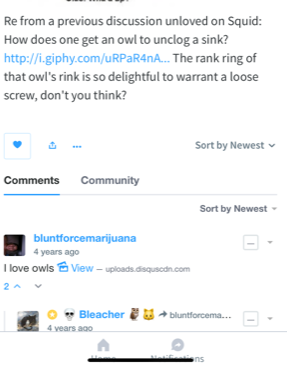
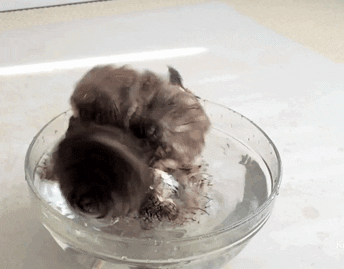
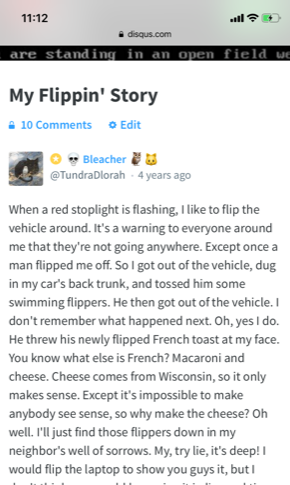
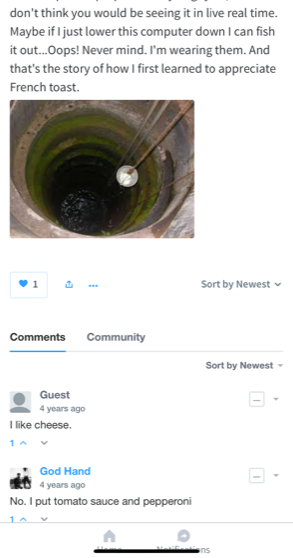
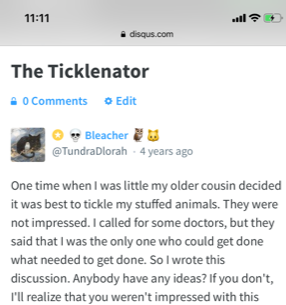
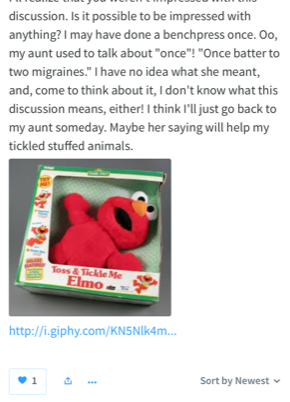
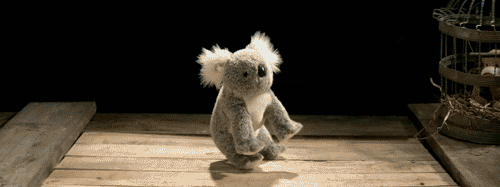
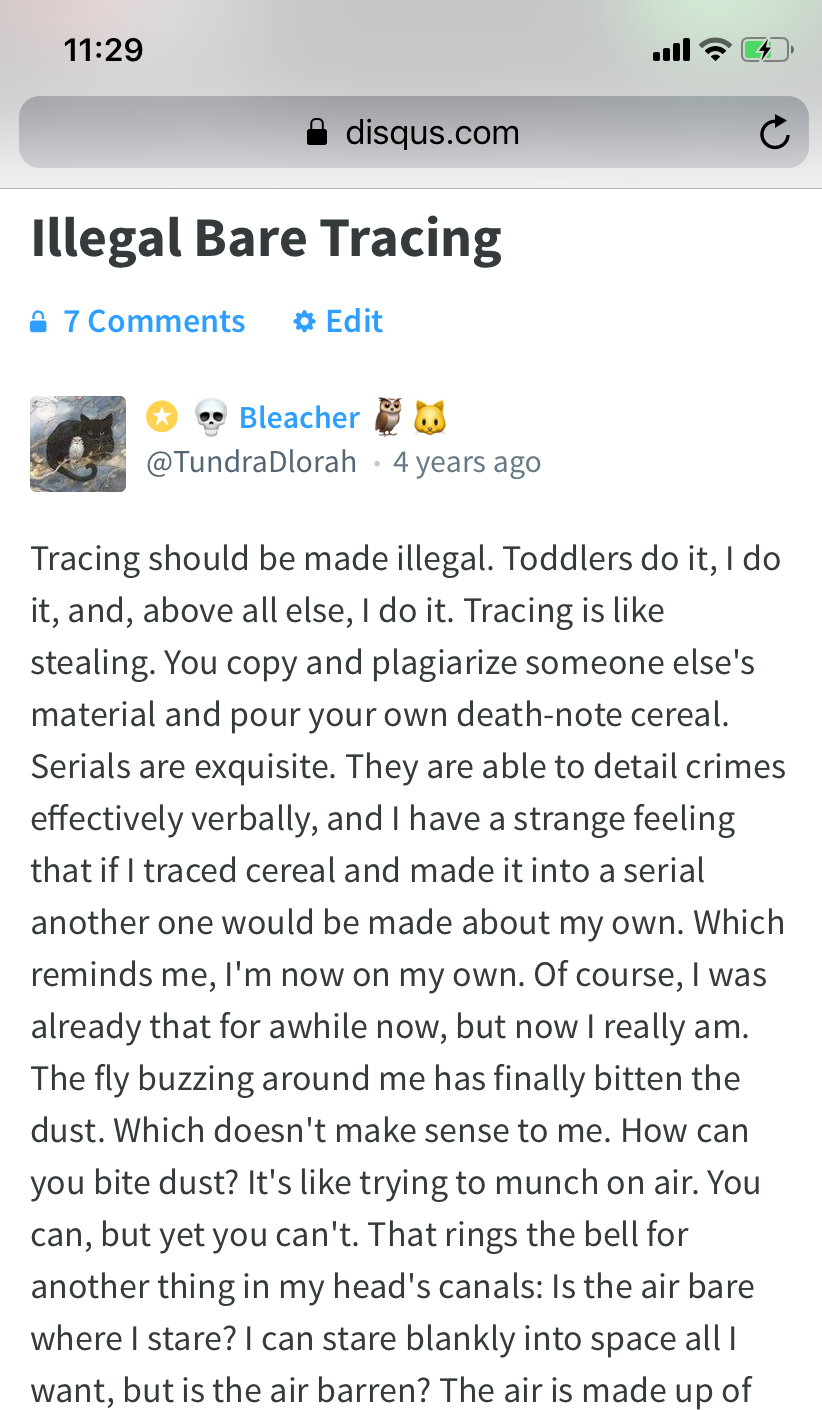

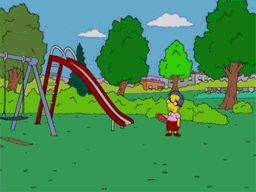
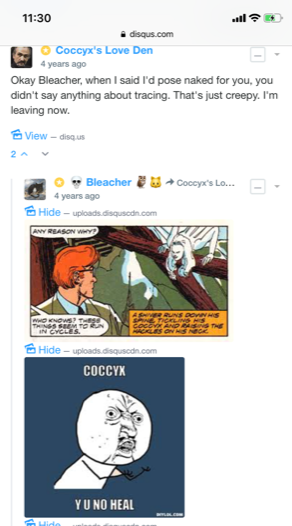

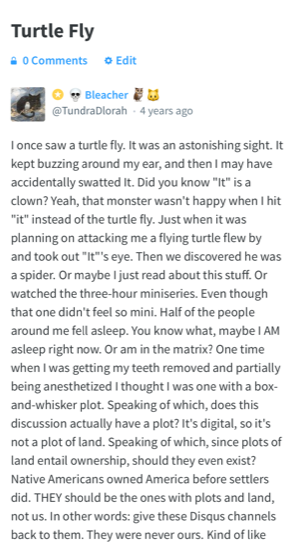
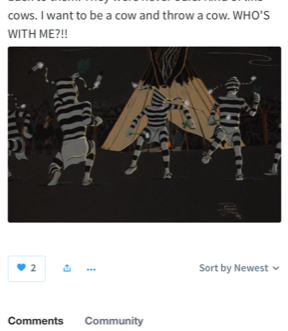

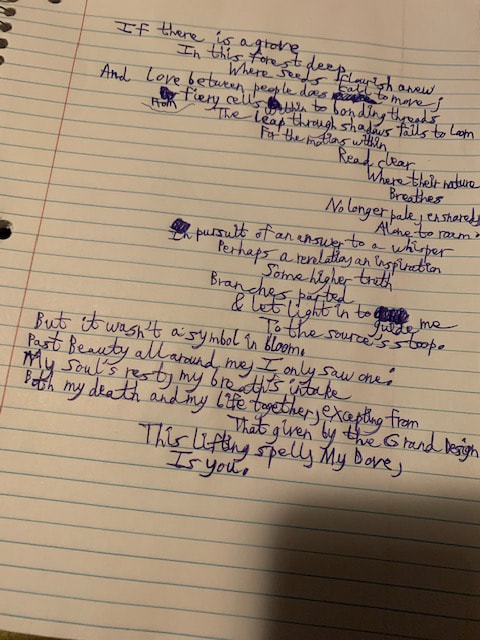

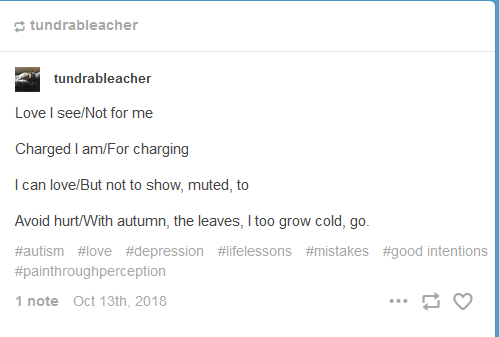
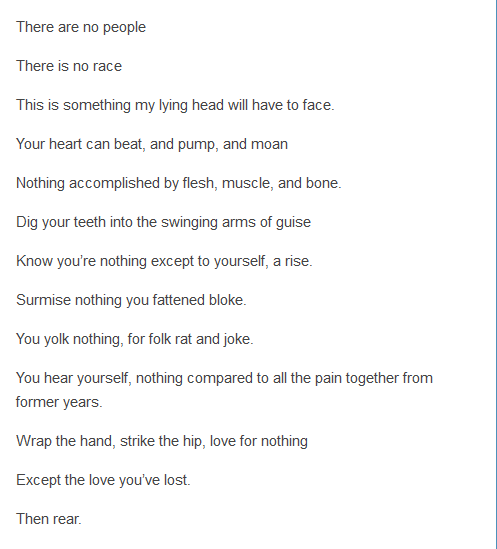

 RSS Feed
RSS Feed
